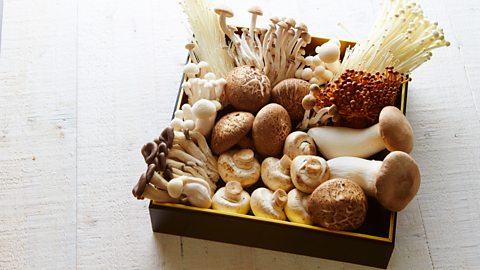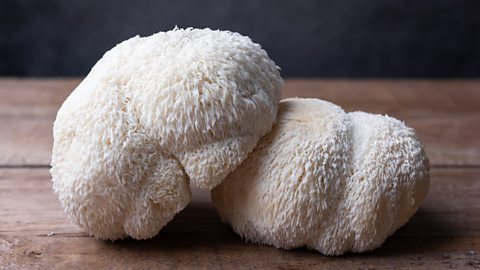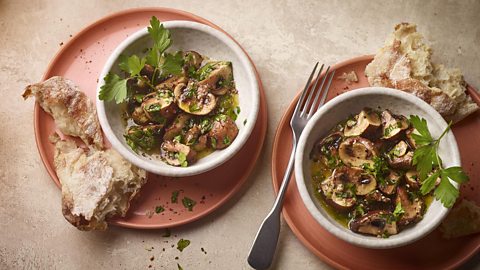From lion’s mane to chestnut, are mushrooms the key to good health?
Magic or myth? Can turkey tail mushrooms boost your immune system or are regular mushrooms beneficial to health? We look at the science…
By dietitian Tai Ibitoye

Whether they’re served as part of a creamy pasta sauce made into a soup, or used to create a stroganoff, mushrooms are incredibly versatile.
But lately, some lesser-known varieties are taking the spotlight for health-related reasons. Do they really have superpowers? Here’s what the scientific evidence says…
Lion's mane
Lion's mane mushrooms, known scientifically as Hericium erinaceus have quickly risen to fame on social media and are often promoted in tea and supplements. Imagine fluffy white pom-poms or, of course, the mane of a lion—that's what they look like! These mushrooms add visual appeal but beyond their appearance, they're believed to be packed with compounds that have antioxidative, anti-inflammatory, antimicrobial and cardio-protective properties.
Interestingly, there's growing research suggesting lion's mane mushrooms could offer cognitive benefits, potentially helping in the treatment of early Alzheimer's disease. A small 2020 study saw 49 participants, who were 50 years old and above take either lion's mane capsules or identical placebo capsules for almost a year. The study included cognitive assessments, blood tests and neuroimaging and found that those taking lion's mane showed significant improvements in their Cognitive Abilities Screening Instrument (CASI) and Mini-Mental State Examination (MMSE) scores, as well as in their daily living activities, compared to the placebo group.
While the study's design is highly regarded in the research world for minimising biases, it's important to remember this was a small pilot study. The findings need to be confirmed by larger, longer-term studies to be more widely accepted. Additionally, it's worth noting that taking lion's mane in capsule form is different from enjoying the whole mushroom in your meals, as the capsules contain a concentrated source of active compounds that might not be safe for everyone. In fact, in the study, some participants reported side effects like abdominal discomfort, nausea and skin rash, which suggests potential tolerability issues.

Preclinical trials have shown that key compounds in lion's mane, such as hericenones and erinacines, can easily pass through the blood-brain barrier and may be responsible for the neuroprotective effects. These compounds are also involved in the production of nerve growth factor (NGF), a type of protein that has been shown to improve neuronal damage, learning and memory deficits.
Most studies looking at lion's mane's effects on cognitive function as well as stress and mood often involve supplementation with varying doses of active ingredients. Many of these studies have small sample sizes and include only specific population groups, use mice models, or are laboratory-based. While these initial results are promising, more extensive research is needed to confirm these benefits and ensure safety.
Shiitake
Shiitake mushrooms (Lentinula edodes) are brown-capped mushrooms known for their rich umami flavour, which intensifies when dried. They often bring a savoury, meaty flavour to stir-fries, soups, stews and more.
Nutritionally dense, they contain essential minerals such as potassium, magnesium, iron and phosphorus, which are vital for maintaining various bodily functions.
They are also a source of B vitamins, all crucial for energy production and nerve function.
Chicken, miso and mushroom ramen
This Tom Kerridge ramen uses both porcini and shiitake mushrooms

Research suggests regular consumption of shiitake mushrooms can help maintain and improve the immune system. One small study involving 52 adults aged between 21-41 years old, found that consuming 5 or 10 grams of shiitake mushrooms daily for four weeks led to improvements in immune markers, as evident from saliva and blood samples. Specifically, the study noted a significant reduction in C-reactive protein (CRP) — a biomarker that tends to rise when there’s inflammation in the body — after four weeks. Additionally, other immune markers showed significant changes, highlighting their role in cell growth, survival and immune response regulation.
Studies in mice and cell cultures attribute these immune benefits to lentinan, a type of beta glucan found in shiitake mushrooms. Lentinan is believed to enhance the immune system by increasing the activity of certain immune cells.
However, further research on the health benefits of shiitake mushrooms – including longer durations and larger human participant groups are required. Additionally, participants' usual diets are not always controlled in these studies, making it challenging to attribute health improvements solely to shiitake mushrooms.
Shiitake mushrooms are also available in supplement form, but caution is needed as some mushroom-based supplements on the market are not rigorously tested for potency and doses may exceed what you would typically consume through food.
Swap pulled meat for ‘pulled’ shiitake mushrooms in this Dr Rupy recipe
Turkey tail
Turkey tail mushrooms (Trametes versicolor) are often consumed in supplement form, but they can also be brewed into tea or added to soups and broths. They’re linked to having potential immune benefits.
Turkey tail mushrooms are a source of antioxidants, including phenols and flavonoids, which may protect body cells from damage caused by free radicals.
It is also thought that turkey tail mushrooms may improve gut health as they contain prebiotics that help nourish beneficial bacteria. One laboratory study found that turkey tail extract modified gut bacteria composition by increasing populations of the ‘friendly’ bacteria like bifidobacterium and lactobacillus while lowering potentially harmful bacteria such as Staphylococcus.
Despite their potential, scientific research on turkey tail mushrooms remains limited. Further studies, particularly clinical trials, are needed to fully understand and establish the nutritional benefits for both healthy individuals and those with specific medical conditions. Also, the long-term efficacy and safety of taking turkey tail mushrooms in supplement form requires further investigation.
Sliced Bread: Mushroom Coffee. podcast
In this episode of Sliced Bread, Greg Foot explores whether there are health benefits to mushroom coffee. Listen now on BBC Sounds

Are regular mushrooms just as good?
Regular mushrooms like white, chestnut, portobello and button mushrooms should not be overlooked. They are highly nutritious and contain essential nutrients such as dietary fibre, B vitamins, selenium, potassium and antioxidants.
As we currently experience the chill of the UK winter weather, it is crucial to get enough vitamin D and most mushrooms contain this fat-soluble vitamin, which supports healthy bones, teeth and muscles by regulating calcium and phosphate levels in the body. Vitamin D comes in two main forms: D3 (found in animal products) and D2 (found in mushrooms and yeast). Both types can effectively boost vitamin D levels in the blood, making mushrooms a great option for those on a plant-based diet.
Our top tips for cooking mushrooms
Interestingly, evidence suggests that when mushrooms are exposed to midday sunlight, they can produce significant amounts of vitamin D2. The amount depends on factors like the season, weather and exposure duration. For maximum vitamin D2 production, slice the mushrooms to increase their surface area before basking them in the sun. It's a simple yet effective way to get more of the vitamin D than whole mushrooms for the same amount of sunlight exposure.
Enjoying mushrooms in your diet
Mushrooms, with their diverse range of appearances, flavours and textures, are a great addition to many dishes. From the mild, nutty notes of white button mushrooms to the rich, meaty texture of Portobellos, there’s a mushroom to suit most palates.
Mushrooms can be added to soups and stews for a boost of umami flavour, or you can toss them into stir-fries, rice and risotto dishes and pasta dishes. They also make a delightful topping for pizzas and can be used as a meat substitute for burgers – perfect for a plant-based option.
Air fryer mushrooms
You can even cook your mushrooms in the air fryer!

Incorporating mushrooms into your diet can be both tasty and nutritious, but it is important to always keep your health needs and preferences in mind (for example some people have allergies to mushrooms). If you are considering taking a mushroom supplement, consult with your doctor or dietitian first.
Please note: Information is not intended as a substitute for proper medical diagnosis or dietary advice provided by your dietitian. Please always seek advice from a dietitian for tailored dietary advice and support.
Originally published January 2025
Want more? Visit BBC Food on Instagram, Facebook and Pinterest. Want to watch the latest Food TV programmes? Visit BBC iPlayer.



